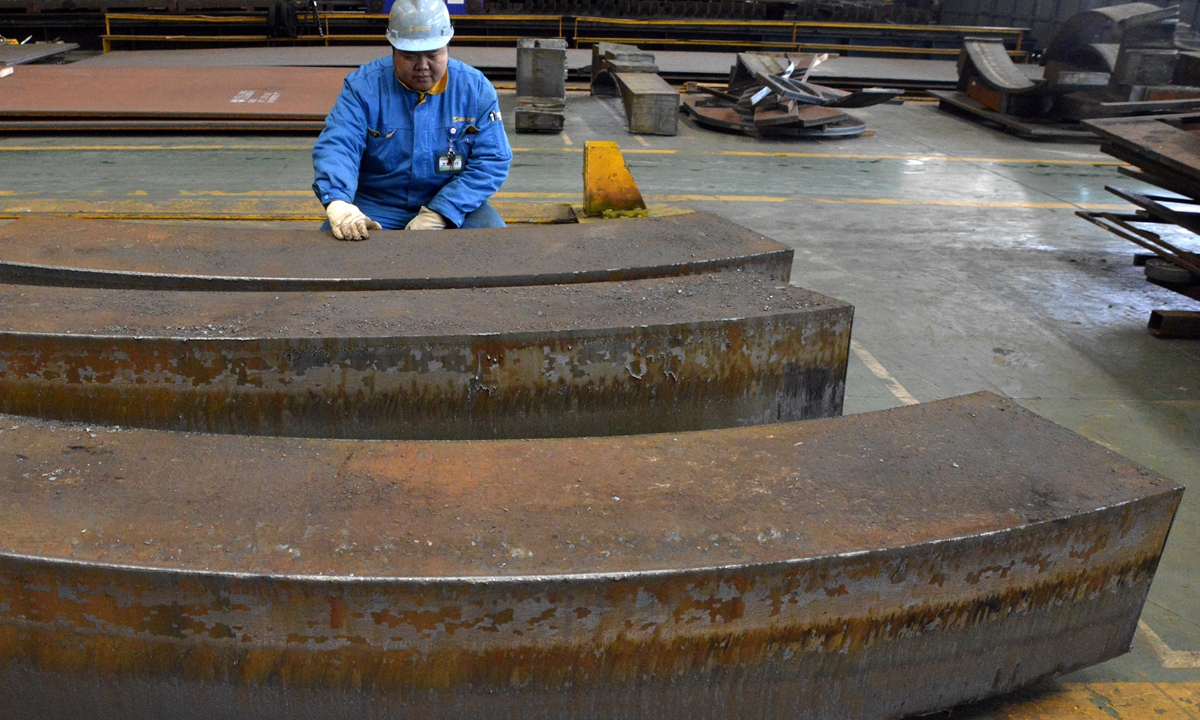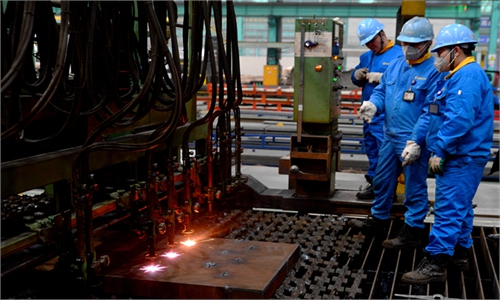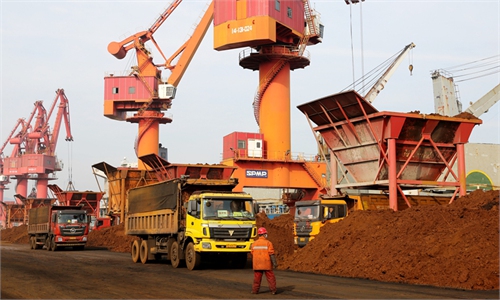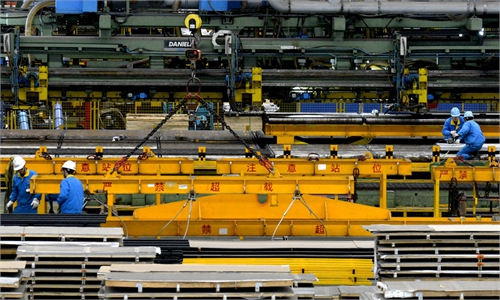Regulators in top steel-making cities warn of price abnormalities to curb runaway steel prices

A worker checks the quality of steel plates at a factory in Taizhou, East China's Jiangsu Province on Monday. Data from the National Bureau of Statistics showed that in the first two months of 2021, China's total value added of industrial enterprises above designated size grew by 35.1 percent year-on-year. Photo: cnsphoto
Market regulators in two Chinese steel-making cities warned steel mills of runaway steel prices on Friday, in what analysts and industry insiders described as a "strong sign" of the government's determination to curb commodities prices.
Commodities futures and spot prices for iron ore and some steel prices started showing signs of being tamed on Friday. Earlier in the week, three Chinese exchanges hiked transaction fees amid rising attention from the Chinese government.
Market regulators in Tangshan, North China's Hebei Province, on Friday summoned all the iron and steel companies in the city and warned them to stay away from any pricing abnormalities, including speculations and hoarding.
Regulators noted that the surge in steel prices has far exceeded that of the rise of iron ore and threatened to impose "severe" penalties, even including revoking business licenses, if steel makers are found to have engaged in illegal pricing activities.
Tangshan, the world's largest steel-producing city and dubbed as China's steel capital, produced about 14 percent of China's raw steel in 2020.
On the same day, the municipal government of Shanghai also summoned its steel-making companies, telling them to fulfill social responsibilities and be "cooperative" in government's efforts to stabilize runaway steel prices.
On Friday, most traded futures contracts for iron ore, hot-rolled coils and coking coals showed signs of faltering from historically record high levels.
Iron ore futures were down nearly 10 percent, with hot rolled steel down 6 percent and coking coal declining 6.5 percent, as of press time on Friday.
Wang Jianfu, assistant to the general manager at Shanghai-based consulting firm Steelhome, told the Global Times on Friday that futures prices tend to be very sensitive to market information once they have reached a periodic peak.
Futures prices have gone through the roof in the past two weeks. Iron ore futures, for instance, have increased by over 30 percent.
"Runaway commodity prices have been mentioned by top Chinese authorities at least three times in the past month," Wang said, noting multiple factors, including authorities' attention and exchanges' hiking of transaction fees may be behind the faltering of futures prices for iron ore, coal, steel and others.
"Both futures and spot prices will be affected by this round of price adjustments," Wang said, noting that domestic steel prices have risen to levels on par with that of the overseas market.
A senior executive at a shipbuilding company in Wuhan, Central China's Hubei Province, described the situation as "extremely abnormal," noting that such futures prices hikes are not the same as mild price inflation that benefits economic growth.
Affected by receding futures prices, spot prices for a number of commodities including steel rebar receded on Friday.
Analysts pointed out regulators' talks with steel mills showed the government's determination to rein in runaway commodities prices, which weighed on lower-stream industries.
Commodity prices have been on the rise due to demand from China's recovery from the pandemic and an inflation of prices at the global markets due to countries' monetary easing policies.
A rapid rise in commodities prices has been noted by the Chinese central government, with the State Council Executive Meeting issuing a statement on coping with the impact of runaway commodity prices.
The Shanghai Futures Exchange, the Dalian Commodity Exchange and Zhengzhou Commodity Exchange issued statements on Monday targeting bulk commodity prices, such as iron ore, aiming to curb them in order to stabilize the market. The exchanges hiked transaction fees for products including iron ore, steel rebar and steam coal.
In its monetary policy report for the first quarter published on Tuesday, the People's Bank of China, the central bank, noted the risk of "imported inflation" from global commodities price hikes, but said such risks can be tamed.




